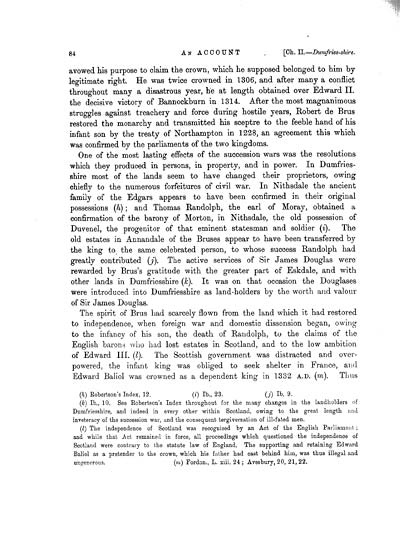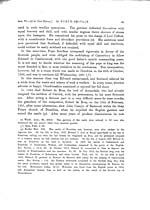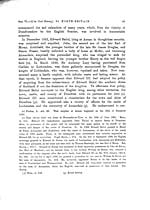Volume 5
(90) Page 84
Download files
Individual page:
Thumbnail gallery: Grid view | List view

84 avowed his purpose to claim the crown, which he supposed belonged to him by legitimate right. He was twice crowned in 1306, and after many a conflict throughout many a disastrous year, he at length obtained over Edward II. the decisive victory of Bannockburn in 1314. After the most magnanimous struggles against treachery and force during hostile years, Robert de Bras restored the monarchy and transmitted his sceptre to the feeble hand of his infant son by the treaty of Northampton in 1228, an agreement this which was confirmed by the parliaments of the two kingdoms. One of the most lasting effects of the succession wars was the resolutions which they produced in persons, in property, and in power. In Dumfries- shire most of the lands seem to have changed their proprietors, owing chiefly to the numerous forfeitures of civil war. In Nithsdale the ancient family of the Edgars appears to have been confirmed in their original possessions (h); and Thomas Randolph, the earl of Moray, obtained a confirmation of the barony of Morton, in Nithsdale, the old possession of Duvenel, the progenitor of that eminent statesman and soldier (i). The old estates in Annandale of the Bruses appear to have been transferred by the king to the same celebrated person, to whose success Randolph had greatly contributed (j). The active services of Sir James Douglas were rewarded by Brus's gratitude with the greater part of Eskdale, and with other lands in Dumfriesshire (k). It was on that occasion the Douglases were introduced into Dumfriesshire as land-holders by the worth and valour of Sir James Douglas. The spirit of Brus had scarcely flown from the land which it had restored to independence, when foreign war and domestic dissension began, owing to the infancy of his son, the death of Randolph, to the claims of the English barons who had lost estates in Scotland, and to the low ambition of Edward III. (l). The Scottish government was distracted and over- powered, the infant king was obliged to seek shelter in France, and Edward Baliol was crowned as a dependent king in 1332 A.D. (m). Thus (h) Robertson's Index, 12. (i) Ib., 23. (j) Ib. 9. (k) Ib., 10. See Robertson's Index throughout for the many changes in the landholders of Dumfriesshire, and indeed in every other within Scotland, owing to the great length and inveteracy of the succession war, and the consequent tergiversation of ill-fated men. (l) The independence of Scotland was recognised by an Act of the English Parliament ; and while that Act remained in force, all proceedings which questioned the independence of Scotland were contrary to the statute law of England. The supporting and retaining Edward Baliol as a pretender to the crown, which Ms father had cast behind him, was thus illegal and ungenerous. (m) Fordon., L. xiii. 24 ; Avesbury, 20, 21, 22.
Set display mode to:
![]() Universal Viewer |
Universal Viewer | ![]() Mirador |
Large image | Transcription
Mirador |
Large image | Transcription
Images and transcriptions on this page, including medium image downloads, may be used under the Creative Commons Attribution 4.0 International Licence unless otherwise stated. ![]()
| Caledonia, or, An account, historical and topographic of North Britain from the most ancient to the present times > Volume 5 > (90) Page 84 |
|---|
| Permanent URL | https://digital.nls.uk/74530304 |
|---|---|
| Description | Vol. V. |
|---|---|
| Attribution and copyright: |
|

